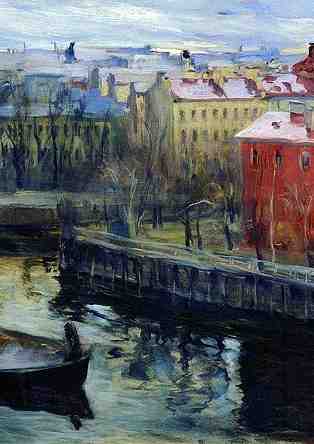Fedor Sologub generally employed a limited vocabulary, but made extensive use of simple words as symbols or extended metaphors. That's
something we must bear in mind when translating his poetry. It's true that the translator can only work with what's given him, the plain words on the page, but they have
to be interpreted in the broader light of what we know generally of Sologub's aims in other work. Sologub's romantic resentment of heaven was coupled with a fertile visual imagination, {1} and here, in this late poem,
that is only entitled as the first line, we have an extended allegory.
Mankind's passage on the earth and his hope of salvation has been
transposed to the canine world, though without improving on Sologub's generally gloomy view of life. The 'traveler' I would read below as Christ the Saviour, who may, at least in Sologub's eyes,
be friend or foe. Dogs bay at the moon, and the poem ends in our human longings for something we cannot have.

We should always read what critics and other translators have made of our subject, but here a faithful transcription will also make matters plain. The poem, as the machine
translation below indicates, is very 'spare': a line of four stresses and then a line of two.
Short lines make for rhyming difficulties, of course, but they are not
insurmountable, as the rendering below indicates. In short, by being faithful to the form we shall also uncover the meaning.
Высока луна Господня...
Высока луна Господня.
Тяжко мне.
Истомилась я сегодня
В тишине.
Ни одна вокруг не лает
Из подруг.
Скучно, страшно замирает
Все вокруг.
В ясных улицах так пусто,
Так мертво.
Не слыхать шагов, ни хруста.
Ничего.
Землю нюхая в тревоге
Жду я бед.
Слабо пахнет по дорог
Чей-то след.
Никого нигде не будит
Быстрый шаг.
Жданный путник, кто-ж он будет,
Друг иль враг?
Под холодною луною
Я одна.
Нет, не вмочь мне, — я завою
У окна.
Высока луна Господня,
Высока.
Грусть томит меня сегодня
И тоска.
Просыпайтесь, нарушайте
Тишину.
Сестры, сестры! войте, лайте
На луну!
1922
The TTS Audio Recording is:
The poem is written in iambics rhymed 4a2b4a2b, where upper case indicates the feminine rhyme:
Грусть томи́т меня́ сего́дня 4A
И тоска́. 2b
Просыпа́йтесь, наруша́йте 4A
Тишину́. 2b
The only translation known me is that on
Ruverses by U.R. Bowie. It's a little free
in places but has an attractive 'doggie' viewpoint. The last stanza runs:
Awaken all canines, you borzois and hounds,
Loft all your wails out of tune.
Sisters and brothers, yelp out yowling sounds;
Keen at the sky and the moon!
It's a very enjoyable rendering, but its jovial tone rather misses what Sologub is saying.
The tone and poem's simplicity is evident even in a machine translation of the Russian:
The moon of the Lord is high
It's hard for me.
I have suffered today
In silence
There's not one barking around
Of my friends.
Boring, dreadful, dead.
All around me.
So empty in the clear streets,
So dead.
No footsteps, no crunching.
Nothing.
I sniff the earth in alarm
I wait for trouble.
There's a faint scent on the road
"There's someone's footprints.
No one's waking up anywhere.
A quick step.
Who's the wayfarer I've been waiting for?
Friend or foe?
Under the cold moon
I am alone.
No, I can't help it, I'll howl
By the window.
The Lord's moon is high,
High.
I'm sad today
I am longing.
Wake up, break the silence
The silence
Sisters, sisters, howl, bark
To the moon!
If we faithfully transcribe the form, the tone and meaning become self-evident:
How high is God’s moon overhead.
How hard for me
to suffer so with nothing said
and let all be.
There’s not a single barking sound
from any friends:
how dead and dull is all round
that silence sends.
No, no bark: no, not a word.
The world is dead:
no crunching sounds, no footsteps heard
in streets ahead.
Anxiously I sniff the ground
for what’s in store,
but then in scent is faintly found
a human spoor.
But no one's waking anywhere,
though brisk steps go.
So is my traveler waiting there
as friend or foe?
Alas, in chilly moon I knew
I was alone,
at windows must, as good dogs do,
make howl and moan.
And so God’s moon, how high it is,
how very high.
Today I’m made more sad by this,
in longing sigh.
Let's do down silence and the dark,
and so quite soon,
good my brethren, growl and bark
up to the moon!
If that seems a little heavy we could use shorter stanzas rhymed 3x2a3x2a:
How the Lord's moon is high:
how hard for me.
I've suffered much today
and silently.
There's no one barking here,
no friendly sound.
The boring, dreadful, dead
lie all around.
In clear and empty streets
that seem so dead,
no crunching footsteps come;
there's nothing said.
Alarmed, I sniff the earth,
for trouble wait.
A faint smell on the road
at any rate.
But no one's waking here.
though brisk steps go.
Is one I'm waiting for
a friend or foe?
Under the cold moon
I am alone.
By nature I'll have my howls
at window thrown.
The Lord's moon in the sky
how high it is.
And so I'm sad today
in feeling this.
Wake up, wake up and break
the silence soon
Sisters, bark and howl
up to the moon!
1. Bristol, E., A History of Russian Poetry (1991, O.U.P.) 179.
2. Mirsky, D.S, Contemporary Russian Literature (Alfred A Knopf, 1926) 196-201.
Russian poem translations on this site: listing.